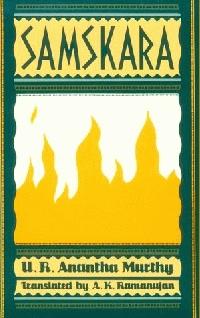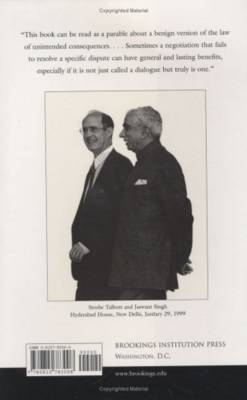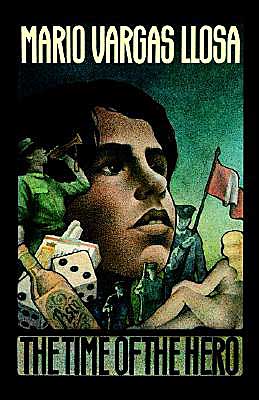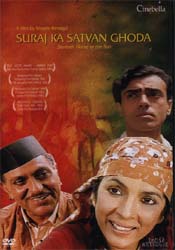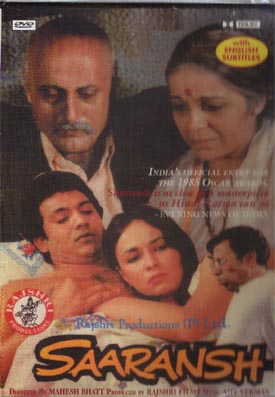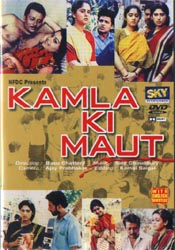Monday, June 18, 2007
Puyalile Oru Thoni

Wow. I Didn't know that tamil literature had writers like P.singaram , till i read this novel.Another awesome novel that completely floored me.
The novel is about the events that happen in the life of pandian,a tamilian living abroad in south east asia.The novel is set in the world war 2 era.After reading so many stories set in the world war 2 era in english.I used to think that there was no good tamil novel(from my limited knowledge) set in that background.Iam correcting that opinion now.This is an awesome novel set in that period with so much information about that time period and about the non resident tamilians who were doing so well in south east asia during that time.
The novel is a cornucopia of information, P.singaram talks about various things in the book.Like world war 2, what was happening in south east asia and how are the characters affected by it.He also puts the war in south asia in context with what was happening world over.World war 2, south asia, off course he talks about INA(Indian National Army),Which had a major contribution from the tamilians living in south east asia.He describes in detail the lifestyles of tamilians from different communities who lived in south asia and how they adapted themselves to the places where they lived.Also there are numerous references to various tamil literatures and some discussions based on them.
Above all the novel is very unsentimental,it is not the usual type which has a few characters and spins a story around them, on there relations ,differences, love etc.This is different, Events happen fast and things keep changing and moving forward.Importance is given to the incidents and environment rather than the characters and feelings.It just takes us on a journey with pandian the main character, who is struggling in this big ocean of life.And yes he faces a lot of storms, what happens to this boat in the storm is the story.
Tuesday, July 11, 2006
Oru Pulliya Marathin kathai(Tale Of A Tamarind Tree)
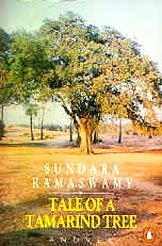
This is by far one of the best books that i have read in tamil.It took me by surprise completely .This is one wonderful book, written superbly by an author who had complete command over the subject and dialect. The man in none other than sundara ramaswamy.What an awesome writer this guy is.
The book as the name suggest is about a tamarind tree standing in a remote vilage in southern tamilnadu. Through the tamarind tree, the mute spectator, sundara ramaswamy gives us a snap shot of the village.It is not about any single Hero or Heroine. It is about the village as a whole. It gives us a beautiful picture of that time period(I was surprised to see that he wrote a novel of this caliber way back in the 60's).The way people lived in those days, there issues, their life style everything is written vividly.
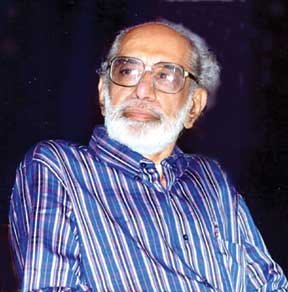
Sundara Ramaswamy is an awesome story teller, he spins stories relentlessly. Stories after stories emerge about the people who live around the tree. Everyone of them interesting and like the various branches of the tree, all these branch stories join into the main one.
Another awesome thing about the book is its language. The authors handling of the local dialect is impeccable. Also he doesn't take any sides in the book and touches many social issues without pointing any fingers.
The book supposedly has gone into many editions and its english translation was released in penguin publications (Iam not sure how the beautiful dialect of that region was captured in english).And it seems to be the first indian book to be translated into hebrew, where it went for two edition. The hindi and malayalam version of the book is also available. Check it out a great book.
Links
Sundara Ramaswamy
The english version in amazon
Books of sundara Ramaswamy
sundara Ramaswamy on Hindu
Anote of sundara ramaswamy writing
sundara ramaswamy passes away
Boston Balaji's blog on sundara ramaswamy
Novel as a critique
sundara ramaswamy on tamil wiki
Tuesday, December 13, 2005
India: A million mutinies now
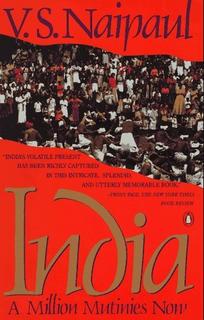
Who can tell,analyze and give various perspectives about charu mazumdhar, Periyar,bal thackrey, ambedhkhar, mahatma gandhi,Namdeo Dhasal, bindralwale and many more in the same book?.Only Naipaul can do that.
When i started reading the book I was still thinking of how to write a review for 'India: A wounded civilization', cause i was so overwhelmed by that book.He questions the basic indian pshyce and shakes the foundation of your thoughts.I was first skeptical of venturing into another naipaul book when i am still not completely out of his previous book.But unlike the wounded civilization, million mutinies wasn't that overwhelming.In wounded civilization, it was all naipaul's perspective, but whereas in million mutinies, naipaul interviews lot of people and there thoughts are are echoed by naipaul.Naipaul does put his opinions also but very less compared to wounded civilization.
I dont know how to classify this book, this can be called a travelogue, cause naipaul travels to bombay, chennai, calcutta, lucknow, kashmir and punjab.He gives us a background of the place and makes us meet various peoples from these regions giving a brief idea about these places.
But naipaul does not stop with a travelogue description, he goes about his business of analyzing and providing critical views on various subjects.We meet different peoples in these regions.A shiv sena party guy and a muslim who lives in a bombay slum.A mylapore brahmin and K.Veeramani of the anti brahmin Dravida party, journalist, politicians, publishers and many more.
Talking about the dravidian movement he comes to MGR and says this.
It was said that at his death some 18,000 files were waiting for his attention.One of the things he had done was to abolish Madras corporation.So madras was in a mess,with mounds of rubbish everywhere.It was as though this too, was part of the revolt of the south,this violation of the old ideas of purity.
Through these people he gives an idea about what is compelling these peoples to do what they are doing. what is going on in there mind.One important guy that he talks to is Mr.vishwanath who is the propreitor of women's era magazine.During naipaul's discussions with him, vishwananth utters some strong statements
The hindu religion is a conglomerations of faiths,500 religion or faiths.We've had reformist movements against orthodoxy.what happens is that every reform movement degenerates into a sect - the lingayats, the arya samajists everybody.Buddha rebelled.Mahavir , the founder of jains,rebelled.Guru Nanak rebelled.It is a long list.They rebelled and degenerated into sects and became as orthodox as the previous orthodox people.
I think religion is the greatest curse of mankind.It has killed more people, destroyed more property, than any other thing.Even today- northern ireland, middle east, hindu,muslims,sikhs, all fighting each other in india.The oldest profession is not prostitution.It is priesthood.
At first many of the topics that are covered seem unrelated.It looks like more of a political view of things happening all around india.But naipaul beautifully sums them up in the end.He looks at everything as india trying to identify itself, a country mutinying against its cultural baggage and past.The sign of change happening, the sign of growth and progress.
To most what happened in the punjab was a pure tragedy.. it seemed that sikhs bad brought this tragedy on themselves,manufacturing grievances out of their great success in independent india.It was as if there was some intellectual or emotional flaw in the community, as if in their fast ,unbroken rise over last century there had developed a lack of balance between their material achievements and their internal life, so that though in one way so adventurous and forward looking in another way they remained close to their tribal and country origin.
Dalip a reporter.
Because i was not impressed by bindranwale.I knew he was not guru gobind singh.I knew he was just being used by indira congress to harm akali party in punjab.He was an ordinary man on whom greatness was being imposed.why should the community accept him?.Why should general shabeg singh not judge him as a man?.why were people just impressed by his angry looks and the armed men around him?.He was not an intellectual, not a thinker, and he was not a pious man.
Talking about the british scholor he quotes from one of his letter...
Great 18th century british scholor Sir william Jones wronte in 1786 to his friend.I shall never cease thinking,that rational liberty makes men virtuous; and virtue happy:wishing therefore ardently for universal happiness,I wish for universal liberty.But our observations on Hindu is too just;they are incapable of civil liberty;few of them have an idea of it;and those who have do not wish it.They must, they must be ruled by an absolute power and I feel my pain much alleviated by knowing the natives themselves... are happier under us than they were or could have been under the sultans of delhi or petty raja.
"They are incapable of civil liberty.They must be ruled by an absolute power".The words expressing the imperial views of that time.But the sad thing is most of the countries below the equator havn't come to terms with not being ruled by an absolute power and civil liberty.
Naipaul talks a lot about Sir william jones who came ot india to make a fortune of 30,000 pounds and made 50,000 in 11 years.He also says he gave back to india a lot. William jones seems to have interacted with many sanskrit scholors and translated many plays like kalidasas's shakuntlam.
The point that made the biggest impact for me was when naipaul said that if not for people like sir william jones, he who was growing up in trinidad before independence could have never had a chance to read about a book like shakuntalam, cause sanskrit was supposed to be the language of gods and only priests and upper caste people could read it.
Another great example of his interesting observation skills.Gandhi the upper caste guy is bare bodied or scantly clad in the pictures where as low caste ambedhkar is in coat and suit.That simple observation makes you think so many things.The insecurity of a group, the way the society looks at them etc.
The book starts in bomabay and after reading few pages, i started seeing the similarities between it and sukhethu's Maximum city.I just wanted to make sure my assumptions were true and i saw this sukethu's interview.
Who provided literary inspiration for you and the book?Joe Mitchell’s Up in the Old Hotel and Joseph Liebling taught me how to write about cities. Plus Ryszard Kapuscinski, V.S. Naipaul — I mean, lots of Naipaul. I read him like a textbook. I very much disagree with many of his political viewpoints, but that whole arc he has in the three nonfiction books on India — An Area of Darkness, A Wounded Civilization, and A Million Mutinies ...more
Another great book by the master.
Links:
http://naipaul.blogspot.com/
Labels: book, english, india, Naipaul
Monday, November 28, 2005
Blindness

Jose Saramago's Blindness is an interesting book. Like stone raft, this is also based on a wild imagination. This time it is "What if an epidemic, which makes everyone blind spreads across the country?".
Saramago has given shape to this question and what follows is an interesting story that creates an imaginary world with many metaphors. He writes it so well that you are totally out of the question of how this epidemic was caused and you are immersed deeply into his imaginary territory.
He creates a different world with the blind peoples.The people who become blind at the start are all put in a separate asylum and power oppression happens, reminding us of george orwell classics.
We live in a refined society which is built over so many rules and regulations, so many Religious and moral rules. In the novel, with the blindness all those imaginary structures are broken and a human is reduced to his primitive self, fighting for his basic needs. With a single stroke the human being's centuries of advancement's are reverted and he is back hunting in groups for food. Saramago exploits these conditions to put forth so many questions to us.
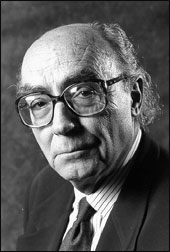 Jose saramago
Jose saramagoThe book reminded me of two things. One was rajeev anchal's movie GURU which was about a fantasy world of blind peoples. Not sure whether he got the idea from this book. and second was the incidents that took place on the aftermath of hurricane katrina.The situation of system breakdown in the books was kind of similar to that of the Katrina aftermath.
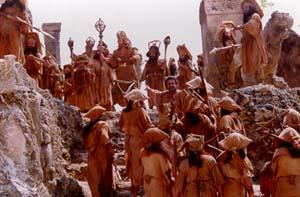 Rajeev anchal's guru.
Rajeev anchal's guru.In this book also Saramago uses his hard to read writing style with page long sentences and paragraphs. But words flow out of this guy like a perennial river.He is just unstoppable with his imagination.
Links
Guru Review at Alternate movies
Jose Saramago's nobel page
Labels: book, english, jose saramago






